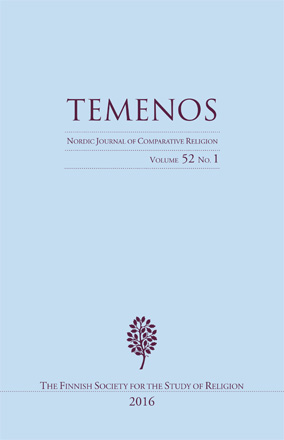Understanding the multiple voices of Islamic modernities: The case of Jihad
DOI:
https://doi.org/10.33356/temenos.52712Keywords:
Multiple Modernities, Islamic Modernity, Islamic Reform, JihadAbstract
In making a contribution to the debate on multiple modernities, this article addresses the growing fragmentation of contemporary interpretations of Islamic religious traditions. It argues that the polysemic nature of these interpretations mirrors to a certain extent the increasing functional differentiation of modern society. To substantiate this argument, the paper will first present a theoretical framework of global modernity that selectively draws on theories of multiple modernities, Modern Systems Theory, and of (post-)structuralist thinking. The empirical part of the paper takes the case of the Islamic institution of Jihad as its illustrative example. From a genealogical perspective, it analyses a number of steps of the (re-)interpretation of Islamic religious traditions from the classical period of pre-modern Islamic empires, via the Islamic reform movement of the nineteenth century, to the multiple voices of Islamic modernities in contemporary times.
Downloads
Published
How to Cite
Issue
Section
License
Copyright (c) 2016 Temenos - Nordic Journal of Comparative Religion

This work is licensed under a Creative Commons Attribution-NonCommercial-NoDerivatives 3.0 Unported License.
Author's Guarantee
- The Author acknowledges that the Work will be publicly accessible on the Internet and that such access will be free of charge for the readers.
- The Author guarantees that the Work is her/his original work that has not been published before and cannot be construed as copying or plagiarism. Furthermore, the Author confirms that the Work contains no statement that is unlawful, defamatory or abusive or in any way infringes the rights of others.
- The Author confirms that she/he has secured all written permissions needed for the reproduction in the Publication of any material created by a third party.
User Rights
Under the CC BY 4.0 license, the Author/s and users are free to:
- Share — copy and redistribute the material in any medium or format,
- Adapt — remix, transform, and build upon the material for any purpose, even commercially,
- However, the Work must be attributed to the original Author and source of publication.
The license of the published metadata is Creative Commons CCO 1.0 Universal (CC0 1.0)
Author Rights
The Authors maintain the right to:
- copyright, and other proprietary rights relating to the Work,
- the right to use the substance of the Work in future own works,
- the right to self-archiving/parallel publishing (publisher's PDF allowed).
Rights of Publisher
- The Publisher reserves the right to make such editorial changes as may be necessary to make the Work suitable for publication in the publication, e.g. style of punctuation, spelling, headings and the like.
- The Publisher will publish the Work if the editorial process is successfully completed and reserves the right not to proceed with publication for whatever reason.
- The publication entitles the author to no royalties or other fees. This agreement will be governed by the laws of Finland.






